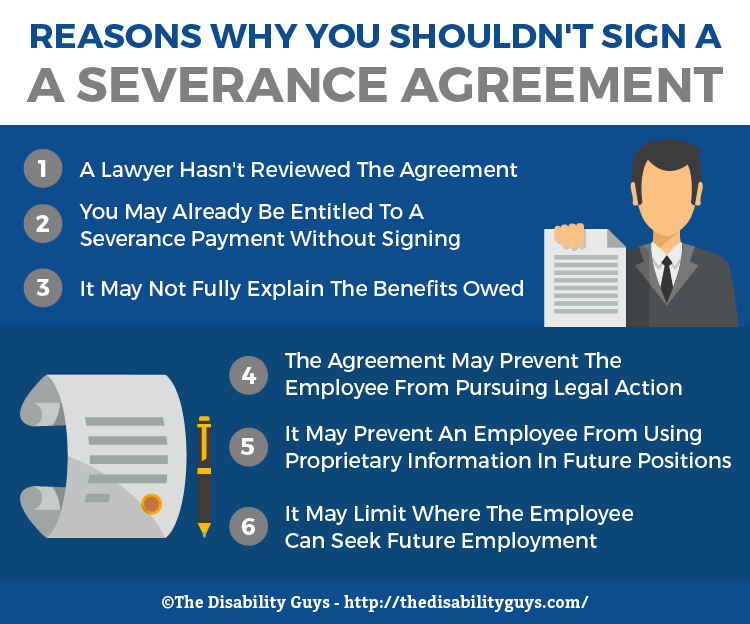There are times, unfortunately, when an employee is terminated, losing their steady income. When an employer notifies an employee that they are being laid-off or fired for reasons other than misconduct, they may offer a severance agreement which often appears to be the answer to their sudden loss, a way for the terminated employee to stay afloat for a while until they secure a new position.
However, severance packages should be reviewed carefully by an attorney because the wording in these complex contacts can hide terms that might have important impacts on the worker who chooses to sign it.
Is My Employer Required To Offer Severance Pay?
In most situations, an employer is not required to offer a severance agreement when terminating employment, unless the employee has a contract which calls for a severance package or the employee handbook indicates that personnel policies include severance pay if the position is terminated.
What Should Be Included In A Severance Package?
There really is no “one size fits all” severance package so what is or should be included in a severance package will depend on the employee and the circumstances surrounding their termination. Typically, a severance package that may be worth considering will include:
- Pay: This is, of course, one of the more important aspects for the employee. A decent severance agreement typically includes one or two weeks pay for each year that an employee worked for the employer.
- Benefits: It may be possible for the terminated employee to retain the health, life, and disability insurance offered to them during their employment for a period of time after their termination and to have the employer continue to pay for those benefits. This is different from COBRA, where the law requires benefits to continue to be offered through the employer, however, under COBRA, the employer doesn’t have to pay for those benefits.
- Outgoing Employee Services: Services which may help the employee find a new job may be offered. This could include career counseling, assistance with writing resumes, and practice interviews.
- Unemployment Benefits Which Won’t Be Contested: It’s not unusual for someone who has lost their job to file for unemployment benefits and it’s also not unusual for an employer to contest that claim. An agreement can be placed into the severance package which prevents the employer from contesting a claim.
- A Letter Of Recommendation: For many, a letter of recommendation is important to have when seeking future employment. That letter can be included in the agreement.
Although these may be excellent benefits to have, it’s important to remember that in exchange, the employee often gives up certain rights.
Share this Image On Your Site
Why Should I Have A Lawyer Review My Agreement?
Before signing a binding contract, it’s always a good idea to have a lawyer review the contract. This is especially true for severance agreements because:
You May Already Be Entitled To Severance Payment
If the person who is being terminated is already owed severance pay through a contract or because of company policy, there is no need to sign additional paperwork which may limit the employee’s rights.
A Non-Disparagement Agreement May Be Included
This means that an employee cannot speak about the employer in a negative or belittling way but typically doesn’t prevent the employer from doing the same regarding the employee – which may impact that employee when future employers are seeking references.
A Release Of Claims May Be Included
When an employer presents an employee with a severance agreement offer, the language used in the offer frequently gifts the employer with a release of claims, which means that once signed, the employee can no longer file a legal claim against their employer.
The Paperwork May Not Include Oral Agreements
An employer may promise things left and right but without those promises in writing, it can be very difficult for the employee to force the employer to keep those promises.
A Restrictive Covenant May Be Included
An example of this is a non-compete clause. Although it’s common for employers to request that an employee sign a non-compete clause, the severance agreement may expand upon the original documentation, severely limiting where the employee can seek future jobs.
The Employer May Require Cooperation Provisions
If the employer is under investigation or facing legal action, a cooperation provision may mean that the employee has to cooperate fully.
These are just a few examples as to why it’s best to have an experienced Employment Law Attorney carefully review the paperwork and negotiate on your behalf before signing anything.
The EEOC Prevents A Release Of Claims Regarding Wrongful Termination Or Discrimination
The U.S. Equal Employment Opportunity Commission (EEOC), published a document titled “Understanding Waivers Of Discrimination Claims In Employee Severance Agreements” which protects the rights of employees who have been either discriminated against or wrongfully terminated.
According to the EEOC, even if “your severance agreement may use broad language to describe the claims you are releasing, you can still file a charge with the RROC if you believe you were discriminated against during employment or wrongfully terminated. In addition, no agreement between you and your employer can limit your right to testify, assist, or participate in an investigation, hearing, or proceeding conducted by the EEOC under the ADEA, Title VII, the ADA, or the EPA. Any provision in a waiver that attempts to waive these rights is invalid and unenforceable.”
In addition to this, the EEOC makes it clear that if the employee chooses to file a complaint with the EEOC after signing a severance agreement, they are not required to return the pay or benefits they received.



